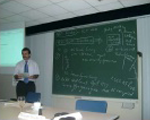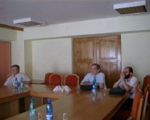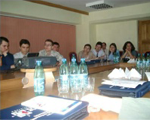Foundation for promoting
Information and Communication Technology
Cisco Networking Academy Program, Constanta, Romania
CISCO Learning Subscription - CISCO® - CCNA® R&S, CCNA® Security,
Cisco® IT Essentials:PC Hardware and Software, NDG Linux®,
PCAP: Programming Essentials in Python,
Cisco® IoT Fundamentals (Arduino, Raspberry PI, Python),
CLA: Programming Essentials in C,
CLP: Advanced Programming in C,
CPA: Programming Essentials in C++,
CPP: Advanced Programming in C++

CCNA - Cisco Certified Networking Associate®
Enrollment
CCNA®v7
General Description
Cisco Systems® Company, worldwide leader in technology and innovation, by its representative in Romania and Romanian Ministry of Research and Education, has established a partnership agreeing to join CISCO Networking Academy program. More than 191 other countries have become members of this program, with over 24 million students starting with 1997.
Cisco Networking Academy Program has developed in Romania by virtue of a Strategic Protocol of Collaboration signed by Romanian Ministry of Research and Education and Cisco Systems. This program is meant to update and complete knowledge for people interested in computer networks, in ICT more generally.
As a Cisco Networking Academy, the Foundation for promoting Information and Comunication Technology (ICT Foundation),(in Romanian: Fundatia pentru promovarea Tehnologiei Informatiei si Comunicatiei), Constanta, Romania, delivers a comprehensive, 21st century learning experience to help students develop the foundational ICT skills needed to design, build, and manage networks, along with career skills such as collaboration, problem solving, and critical thinking. With an active presence for over 25 years, ICT Foundation is specialized in courses which prepare students for a career in Information and Communication Technology. Courses are taught by teachers from High School and University. Courses coordinator: Assoc. Prof. Eugen PETAC, Ph.D., Cisco Instructor Excellence Award, Cisco Instructor Excellence Advanced,, Cisco Instructor Years of Service .
ICT Foundation, Constanta, is formed as a Romanian juridical person with private law, nongovernmental, nonpolitical, nonprofit, impartial, independent and with no patrimonial purpose, for promoting Information and Communication Technology in all Romanian social environments.
The advantages of the settled partnership are:
- The students are properly trained for future framing for job selection concerning Information and Comunication Technology;
- The companies will benefit from information and communication technology specialists, proper trained and certified.
At the end of each course the students receive a certificate of completion of each semester, issued by Cisco Systems and countersigned by ICT Foundation, Constanta, Romania, in which the volume and type of material studied and graduate skills are indicated. A course is considered completed with good results by reaching a percentage of minimum 80%. This percentage is obtained as a result of a good preparation of the student as a result of the accumulation of theoretical and practical knowledge, being followed by successful online exams on the Cisco server from the USA, as well as carrying out practical laboratory activities. The online exams that are sustained and the practical activities, are conducted in the laboratory of our institution, targeting each chapter, plus the pre-final and final assessments.
Foundation for promoting Information and Communication Technology (ICT Foundation), Constanta, Romania, was awarded the "2015 Academy Curriculum Excellence Award", in recognition of CCNA Curriculum Excellence and lasting contribution to the Cisco Networking Academy program®, by the Cisco Networking Academy, last April 16, 2016. The annual Academy Curriculum Excellence award is presented to one academy in each region for achieving excellence in teaching a curriculum. The Cisco Networking Academy program uses a rigorous process to select academies for this award based on several criteria. Assoc. Prof. Eugen Petac, Ph.D., received the award on behalf of the ICT Foundation.
CISCO Lab, ICT Foundation, Constanta
Cisco CCENT and CCNA certification exams
Cisco Systems®, world leader in Information and Communications Technology - ICT has put together the program CCNA® (Cisco Certified Networking Associate), unique by its content and structure.
CCNA® (Cisco Certified Networking Associate) is composed by a theoretical and practical course. At ICT Foundation, Constanta, Romania, the training process is personalized for every student. The theoretical part is presented in English and it can be accessed on-line. This is presented rhythmically and documented in the training program conducted under the direction of a teacher/instructor. The practical part takes place in the Cisco Academy laboratory of the ICT Foundation, Constanta, Romania, which is equipped with computers, software, simulators and proper Cisco Systems equipment. The course cover the networking basics, from Local Area Network (LAN) and Metropolitan Area Network (MAN) to Wide Area Network (WAN).
The course is addresseed to high school and university students, as well as people working in operating, designing, building and maintaining computer networks and modern data communication systems. The course is also recommended for those students who choose interdisciplinary training.
Since the '80's networks, which used coaxial thin cable and which were used mostly for one building, nowadays it has reached a moment when computers, generally intelligent systems, not connected to networks or Internet don't exists. The technologies used for data communication are more complex, the percentage of the people using computers has been exponential during the last decade. In fact, all activity fields use, for various purposes, network computers.
Cisco defines the Internet of Everything (IoE) as "bringing together people, process, data, and things to make networked connections more relevant and valuable than ever before - turning information into actions that create new capabilities, richer experiences, and unprecedented economic opportunity for businesses, individuals, and countries".
In order to ensure professional data communication services it has been proved that professional equipment isn't enough. Qualified specialists are needed with high quality training.
A study conducted by IDCrequested by Cisco Systems shows what the situation in the workforce in ICT (Information and Communication Technology). Career development of our graduates is a goal to which we contribute by carrying out a high quality of teaching, appropriate for all activities of the Foundation for promoting ICT (ICT Foundation), Constanta, Romania.
Constanta.
Cisco® has created a new version of CCNA®, CCNA v6.X version - CCNA Routing and Switching®, four semesters, in response to the requests of administrators, instructors and students/trainees in the context of the current development and in the immediate future of the Society. The courses provide relevant lessons with practical aspects, being accompanied by relevant case studies and practical laboratory materials. Depending on the achievements and their educational/academic goals, in the context of basic training that targets a certain level of training, the CCNA training programs caters to different levels of students/learners, from those who know the basics of computer continuing with those analytical skills, to those passionate for developing software systems engineering, system administration/ network administration.
At the end of each semester of the CCNA® course (CCNA Routing and Switching®, 4 semesters) the students will receive a Certificate of Completion of each semester, issued by Cisco Systems® and countersigned by ICT Foundation, Constanta, Romania in which the volume and type of material studied and graduate skills are indicated. A course is considered completed with good results by reaching a percentage of minimum 80%. This percentage is obtained as a result of a good preparation of the student as a result of the accumulation of theoretical and practical knowledge, being followed by successful online exams on the Cisco® platform from the USA, as well as carrying out practical laboratory activities. The online exams that are sustained and the practical activities, are conducted in the laboratory of our institution, targeting each chapter, plus the practice final and final assessments. The CCNA certification (Cisco Certified Networking Associate), is obtained after the accumulation of knowledge in computer networks and data communications. CCNA program graduates receive discounts of 58% to support this certification.
Depending on the achievements and their educational/academic goals, in the context of basic training that targets a certain level of training, the CCNA® training programs caters to different levels of students/learners, from those who know the basics of computer continuing with those analytical skills, to those passionate for developing software systems engineering, system administration/ network administration.
Cisco CCNA Routing and Switching® - Course Structure
Cisco CCNA 1 - Introduction to Networking
Cisco CCNA 2 - Routing and Switching Essentials
Cisco CCNA 3 - Scaling Networks
Cisco CCNA 4 - Connecting Networks
In each course, Networking Academy® students will learn technology concepts with the support of interactive media and apply and practice this knowledge through a series of hands-on and simulated activities that reinforce their learning.
CCNA Security® is addressed to those who graduated from the CCNA® course described above. It is organized within a semester, involving both theoretical and practical aspects. Being of a similar approach as the CCNA program, CCNA Security® provides the premises for training in a field of a great interest, that of security systems and computer networks, in the context of small and medium organizations.
Curriculum Description
CCNA Routing and Switching® teaches comprehensive networking concepts, from network applications to the protocols and services provided to those applications by the lower layers of the network. Students will progress from basic networking to more complex enterprise and theoretical networking models later in the curriculum.
The CCNA Routing and Switching® curriculum offers the following features and benefits:
- Students learn the basics of routing, switching, and advanced technologies to prepare for the CCENT and CCNA certification exams, networking related degree programs, and entry-level careers.
- The language used to describe networking concepts is designed to be easily understood by learners at all levels and embedded interactive activities help reinforce comprehension.
- Courses emphasize critical thinking, problem solving, collaboration, and the practical application of skills.
- Multimedia learning tools, including videos, games, and quizzes, address a variety of learning styles and help stimulate learning and promote increased knowledge retention.
- Hands-on labs and Packet Tracer® simulation-based learning activities help students develop critical thinking and complex problem solving skills.
- Embedded assessments provide immediate feedback to support the evaluation of knowledge and acquired skills
CCNA Routing and Switching: Introduction to Networking
Introduces the architecture, structure, functions, components, and models of the Internet and other computer networks. The principles and structure of IP addressing and the fundamentals of Ethernet concepts, media, and operations are introduced to provide a foundation for the curriculum. By the end of the course, students will be able to build simple LANs, perform basic configurations for routers and switches, and implement IP addressing schemes.
Chapter 0: Course Introduction
Chapter 1: Explore the Network
Chapter 2: Configure a Network Operating System
Chapter 3: Network Protocols and Communications
Chapter 4: Network Access
Chapter 5: Ethernet
Chapter 6: Network Layer
Chapter 8: IP Addressing
Chapter 9: Subnetting IP Networks
Chapter 7: Transport Layer
Chapter 10: Application Layer
Chapter 11: Build a Small Network
Competences:
CCNA Routing and Switching® includes the following features:
- Describe the devices and services used to support communications in data networks and the Internet
- Describe the role of protocol layers in data networks
- Describe the importance of addressing and naming schemes at various layers of data networks in IPv4 and IPv6 environments
- Design, calculate, and apply subnet masks and addresses to fulfill given requirements in IPv4 and IPv6 network
- Build a simple Ethernet network using routers and switches
- Use Cisco command-line interface (CLI) commands to perform basic router and switch configurations
CISCO Lab, ICT Foundation, Constanta
Cisco CCENT and CCNA certification exams
CCNA Routing and Switching: Routing and Switching Essentials
Describes the architecture, components, and operations of routers and switches in a small network. Students learn how to configure a router and a switch for basic functionality. By the end of this course, students will be able to configure and troubleshoot routers and switches and resolve common issues with static route, RIPv2, VLAN, NAT,ACL, DHCP in both IPv4 and IPv6 networks, and perform device discovery, management and maintenance.
Chapter 0: Course Introduction
Chapter 1: Routing Concepts
Chapter 2: Static Routing
Chapter 3: Dynamic Routing
Chapter 4: Switched Networks
Chapter 5: Switch Configuration
Chapter 6: VLANs
Chapter 7: Access Control Lists
Chapter 8: DHCP
Chapter 9: Network Address Translation for IPv4
Chapter 10: Device Discovery, Management, and Maintenance
Competences:
CCNA Routing and Switching® includes the following features:
- Determine how a router will forward traffic based on the contents of a routing table.
- Explain how switching operates in a small to medium-sized business network.
- Use monitoring tools and network management protocols to troubleshoot data networks.
- Implement access control lists (ACLs) to filter traffic.
- Configure and troubleshoot VLANs and routing with static route and RIPv2.
- Describe the operations of Dynamic Host Configuration Protocol for IPv4 and IPv6
CISCO Lab, ICT Foundation, Constanta
Cisco CCENT and CCNA certification exams
CCNA Routing and Switching: Scaling Networks
Describes the architecture, components, and operations of routers and switches in a large and complex network. Students learn how to configure routers and switches for advanced functionality. By the end of this course, students will be able to configure and troubleshoot routers and switches and resolve common issues with OSPF, EIGRP, STP, and VTP in both IPv4 and IPv6 networks. Students will also develop the knowledge and skills needed to implement DHCP and DNS operations in a network.
Chapter 0: Course Introduction
Chapter 1: LAN Design
Chapter 2: Scaling VLANs
Chapter 3: STP (Spanning Tree Protocol)
Chapter 4: EtherChannel and HSRP
Chapter 5: Dynamic Routing
Chapter 6: EIGRP
Chapter 7: EIGRP Tuning and Troubleshooting
Chapter 8: Single-Area OSPF
Chapter 9: Multiarea OSPF
Chapter 10: OSPF Tuning and Troubleshooting
Competences:
CCNA Routing and Switching® includes the following features:
- Configure and troubleshoot DHCP and DNS operations for IPv4 and IPv6
- Describe the operations and benefits of the Spanning Tree Protocol (STP)
- Configure and troubleshoot STP operations
- Describe the operations and benefits of link aggregation and Cisco VLAN Trunk Protocol (VTP)
- Configure and troubleshoot basic operations of routers in a complex routed network for IPv4 and IPv6
- Configure and troubleshoot advanced operations of routers and implement RIP, OSPF, and EIGRP routing protocols for IPv4 and IPv6
- Manage Cisco IOS® Software licensing and configuration files
CISCO Lab, ICT Foundation, Constanta
Cisco CCENT and CCNA certification exams
CCNA Routing and Switching: Connecting Networks
Discusses theWAN technologies and network services required by converged applications in a complex network. The course enables students to understand the selection criteria of network devices andWAN technologies to meet network requirements. Students learn how to configure and troubleshoot network devices and resolve common issues with data link protocols. Students also develop the knowledge and skills needed to implement IPSec and virtual private network (VPN) operations in a complex network
Chapter 0: Course Introduction
Chapter 1: WAN Concepts
Chapter 2: Point-to-Point Connections
Chapter 3: Branch Connections
Chapter 4: Accesss Control Lists
Chapter 5: Network Security and Monitoring
Chapter 6: Quality of Service
Chapter 7: Network Evolution
Chapter 8: Network Troubleshooting
Competences:
CCNA Routing and Switching® includes the following features:
- Describe the operations and benefits of virtual private networks (VPNs) and tunneling
- Describe differentWAN technologies and their benefits
- Configure and troubleshoot serial connections
- Configure and troubleshoot broadband connections
- Configure and troubleshoot IPSec tunneling operations
- Monitor and troubleshoot network operations using syslog, SNMP, and NetFlow
- Design network architectures for borderless networks, data centers, and collaboration
CISCO Lab, ICT Foundation, Constanta
Cisco CCENT and CCNA certification exams
More informations
Joining conditions: English language at a medium level, knowledge of basics elements in web navigation.
The lecture is hold by Associate Professor Eugen PETAC, Ph.D., Cisco Instructor Excellence Award, Cisco Instructor Excellence Advanced,, Cisco Instructor Years of Service .
Participation fee: 195 EUR per semester, payable in lei, BNR exchange transaction (final price, no VAT). One can either choose full payment for the entire course (three/ four/ five semesters) or to pay for each semester before it starts.
The organizers grant:
1. Qualified professors, from the specialized and certified university and high school teaching staff, with professional degrees certified by Cisco;
2. Modern teaching methods.
3. One by one computer access at a computer upgraded with multimedia;
4. The Customized Training Program provides education, training and support services;
5. Specialized Cisco networking equipment at ICT Foundation laboratory;
6. Customized training program for each individual learner.
7. Latest information, ensured by Cisco Networking Academy.
The courses take place at: The Foundation for promoting Information and Communication Technology (ICT Foundation).
The beginning of the course: will be fixed by a common agreement (between ICT Foundation and students).
We ask you to view the detailed content of the course.
Enrollment: Monday-Friday, 16.00-18.00. Please contact us by phone or email.









